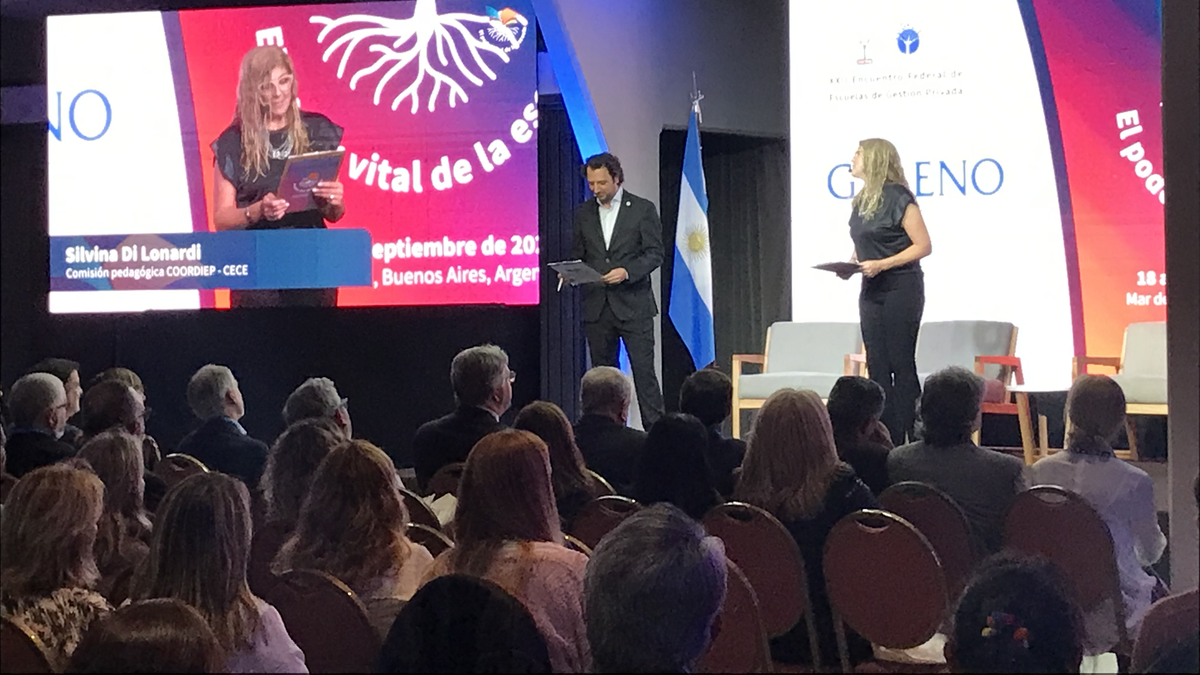Ariel Cohen Imach, director of the Central Council of Jewish Education in Argentina, He reflected on the importance of education in people’s lives and its role in recovering identity and being. In his message he addressed the idea that education is not only about transmitting knowledge, but about giving people back their essence, their identity and their connection with the world.
image.png
Cohen Imach emphasized the need to care for and value what belongs to others, as well as the importance of the community and one’s neighbor in this recovery process. “At school we gather with our own being and our own identity, and we live the exciting dynamic of searching and finding, which is really life itself”he indicated.
Gabriel Perez Schulzgeneral director of the Balcarce Adventist Institute, reflected his vision especially from a faith perspective. He highlighted the importance of education not only as a means to acquire knowledge and values, but also as a process that has an eternal impact on the lives of students. “In Argentina we are 62 institutions, 102 educational units, approximately more than 1,500 teachers and 25,000 students. If we talk about the vital power of school, there is no doubt that education, through the acquisition of knowledge and the transfer of values, has an almost unstoppable power.” he said from the stage set up on the first floor of the Luz y Fuerza hotel.
image.png

Pérez Schulz also mentioned that education based on faith adds a “plus” to the educational process, since it not only focuses on the present life, but also considers eternity and the purpose of serving others. The idea of ”reviving” in the educational context implies rescuing students from ignorance and conformism, giving them tools to find purpose and hope in their lives, he said.
Juan Cruz Mennillias a priest and Episcopal delegate for Catholic Education in the Diocese of Mar del Plata, stressed the importance of the meeting in the educational context from a Christian perspective. For Mennilli, the meeting should not be seen as a simple act of meeting, but as a significant experience that allows one to hear and perceive life in the school environment. “The theme that brings us together reveals that we are on the right path to be able to think and walk together towards the change that reality reveals to us that education demands. We want to beat to the rhythm of the reflections of something alive, which is the school.”he said.
image.png

Mennilli He said that “we are in a global crisis,” which is, among other aspects, educational. And he reminded the Pope Francis: “He tells us: ‘poor humanity without crises.’ “Everything is perfect, everything is in order. Such a humanity would be sick, very sick. A humanity without crisis would be a sleeping humanity. The crisis creates openness, an opportunity for reflection, it brings us to light. It is a call, an invitation to question ourselves, to review our scale of values and the meaning we give to our lives. If we approach this crisis with humility and courage, curiosity and creativity, we will be able to generate new episodes,” he said.
Once the time for reflection was over, the XXII Federal Meeting of COORDIEP continued with the inaugural speeches of the authorities of the entity and national, Buenos Aires, Buenos Aires and Mar del Plata officials in Education.
Fernando RizziUndersecretary of Education of the Municipality of General Pueyrredón, celebrated the “federal character” of the meeting, stressed the importance of education enabling students to fully exercise their rights and develop as dignified and capable individuals and spoke of the “humanization of education”, despite technological advances and artificial intelligence.
image.png

From the lectern, Rizzi advocated for a humanistic education that fosters empathy, emotion and connection between people and He called for “walking” together as a community, highlighting that progress is achieved together and not in isolation.
Juan Carlos TorrendellSecretary of Education of the Nation, justified his absence due to a busy agenda of commitments, but sent a special video.
image.png

In his message, he stressed the participatory and federal approach to education, where schools and associations collaborate to renew educational structures, and appealed to three principles: Educational Justicewhich is the need to ensure that all students have the right conditions to receive a quality education, which implies addressing existing inequalities; freedom of educationa fundamental concept that must be protected and promoted, and the goals and career of trustwhich Torrendell suggests is necessary to finance and expand in order to achieve a more inclusive and effective education, which allows for improving educational quality and fostering an environment conducive to learning.
The host of the meeting and executive secretary of COORDIEP, Norberto Baloiraurged to overcome barriers and concerns in the educational field, emphasizing the need for collaboration among colleagues to face the challenges. One of the main concerns he mentioned was the low birth rate. “Today we are beginning to feel it not only in kindergartens, but also in the first grades, where we are aware of the need”he warned.
image.png

Along those lines, he also warned about the lack of teachers and professors. “The lack of teachers at all levels is due to the discredit of the profession, insufficient salaries and the lack of incentives for training,” He said, and demanded greater respect for the teaching profession. “The loss of respect for the teaching profession, often discredited by the press, which only reports on the few – thank God – negative events that occur in a school. But the work carried out by the more than 14,000 schools with more than 3,200,000 students who attend our schools every day and receive attention and dedication is left aside because it is not news,” said the secretary.
In her speech, Baloira also stressed that educational policies must be analyzed and tested in classrooms before being implemented, avoiding constant changes that do not benefit students. In addition, she advocated for consensus among the parties involved in education, leaving aside partisan disputes to achieve quality education, and He expressed concern about the rise in rates for basic services such as energy, water and gas, which affect schools and families, suggesting the need for relief in each jurisdiction.
Finally, he supported the proposal to declare education as an essential service, which he said could help improve its implementation and support. “The concerns certainly do not end here, but it is everyone’s job to provide answers to these issues,” Baloira concluded.
Patricio Barber Soler, National Director of Private Management Education, took advantage of the large presence of private school owners to announce that, starting next year, schools that receive 75% of contributions will receive textbooks as part of a literacy plan. “This change will benefit one and a half million students, which represents a considerable impact on education,” said.
image.png

The national official also mentioned the importance of addressing the justice in educationrecognizing the needs and difficulties faced by both state-run and privately run schools, and called for greater freedom in the classroom, so that schools can choose the books and pedagogical approaches they consider most appropriate, thus promoting a space for freedom in education. “Freedom is not given, it is exercised,” he stressed.
Javier Raladidirector of Private Education of the Province of Buenos Aires, highlighted the “active listening”, including representatives, delegates and secretaries, and continuous training. When reviewing his management since December of last year, Ralandi commented that progress was made in the “reduction of bureaucracy” in administrative procedures, an improvement in the “Regulatory Review Commission”, which was carried out in conjunction with associations and unions to reformulate processes and streamline procedures, and a territorial deployment for greater proximity. Raladi stressed the importance of traveling throughout the province of Buenos Aires, especially the Conurbano and the interior of the province, to learn firsthand about the realities of the schools.
image.png

The provincial official also advocated for a larger education budget and crossed the cuts at the national level. “The Budget 2025 The National Assembly speaks of the suspension of article 9 of the National Education Law, which guarantees financing of 6% of the GDP, and also speaks of the suspension of article 5, 6 and 7 of the Technical Education Financing Law, with which the INET is financed, and with that technical education is defunded.This creates a kind of paradox in thinking about declaring education as an essential service. An essential service on one hand, it is defunded on the other. There are things that we should think about and review.“, he said. Ralandi revealed that last year about $300,000 million were spent in the Province for education, and that until last July the new administration allocated $390,000 million. “At the end of the year, the increase will be in the Education budget in the province will rise 149% more than in 2023,” he said.
Nora Limageneral director of Private Education Management of the City of Buenos Aires, returned to the triggering question. For the expert, the “vital power of the school” lies in the fact that institutions are a fundamental space for meeting and coexistence, where diversity is celebrated and common bonds are built. “It is that meeting place that houses and celebrates difference and that, through the construction of what is common, shows young people and children that there are other possible worlds, these worlds that allow them to live in harmony, in the construction of links, in the strengthening of values, that allow them to generate life projects so that they can find themselves and find these others in a society that gives them hope,” express.
image.png

“San Martín taught us that education is by example, let us always keep this in mind,” He added: “We are an example even if we don’t want to be. Let us model hope for our children and our youth, let us be able to move them, and the only possible way is to enjoy our task, to be responsible, professional and honest with our work, which is to educate them,” he concluded, giving way to the first keynote speech of the meeting and the presentation of the choir of students from the Adventist Institute of Balcarce.
Source: Ambito
I am Pierce Boyd, a driven and ambitious professional working in the news industry. I have been writing for 24 Hours Worlds for over five years, specializing in sports section coverage. During my tenure at the publication, I have built an impressive portfolio of articles that has earned me a reputation as an experienced journalist and content creator.




